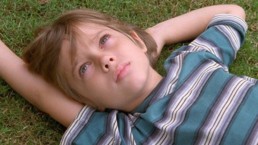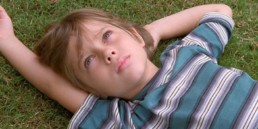Review: ‘Boyhood’
A feat in modern filmmaking, Linklater pulls off a sweeping twelve year-long cinematic experience unlike any other.
Although movies and films have chronicled life and its oft-times messy process of growing up and maturing, never before has one been done like this. Richard Linklater, already an accomplished director with culture-defining films such as Dazed and Confused, offers a new film that sees a young Texas boy, along with his fragmented yet loving family, quite simply, live their lives, all chronicled in a sweeping twelve year shoot that sees its core cast grow up right before your eyes.
Though the name Ellar Coltrane probably doesn’t ring any bells, even with ardent cinematic fans, he will definitely be remembered hereafter for this starring lead effort, here playing Mason, who’s point of view we follow from his early adolescent, all the way through his young adult life. We see a young Mason experience all that youth living offers: from playing outdoors, having to survive embarrassing school moments as new haircut, along with the heavier, more emotionally driving key life moments, such as all that goes with living between houses with divorced parents, with Patricia Arquette as his Mom, and Linklater favorite Ethan Hawke as his Dad (Linklater’s real-life daughter, Lorelei Linklater, also stars in the film as Mason’s sister Samantha), who also are seen aging along with Coltrane. The magic in the film is seeing life, in all of its simple, fun, heartbreaking, and tragic moments, depicted in a lovingly crafted and expansive story.
The experience of watching a scene with young Mason, ending, and cutting to the next scene featuring the actor, having aged in more than a full year’s time, is incredible to behold.
Boyhood stands as a remarkable film, and not because of any specialized story. In fact, there are no over-arching themes or messages that would more likely be written into a fiction film. And this is because of what makes the film so magical, so transporting. It simply captures fragments, scenes, and instances, of simple family life. The experience of watching a scene with young Mason, ending, and cutting to the next scene featuring the actor, having aged in more than a full year’s time, is incredible to behold. It is purely captivating, all because it is so real, and universal.
The movie, from a filmmaking and technical point of view, should be acknowledged for how the story was so effortlessly told. Again, the movie isn’t about any one thing, save for this boy and his family itself, but rather, shows all of life unfolding. Surprisingly, or perhaps understandably, the movie doesn’t intend to feature glamorous or self-serving scenes, and the experience is all the better for it. The mundane-ness of it all grows to fascinating levels, all because of its universality and we can relate exactly to it.
For an independent film, Boyhood‘s ambition is astounding. Though for independent veteran Linklater, the show is pulled together in a truly brilliant effort. Never before has honest, authentic filmmaking been more present, more alive, or spoken to growing up and the human condition than in Boyhood.
Ryan Rojas
Ryan is the editorial manager of Cinemacy, which he co-runs with his older sister, Morgan. Ryan is a member of the Hollywood Critics Association. Ryan's favorite films include 2001: A Space Odyssey, The Social Network, and The Master.


